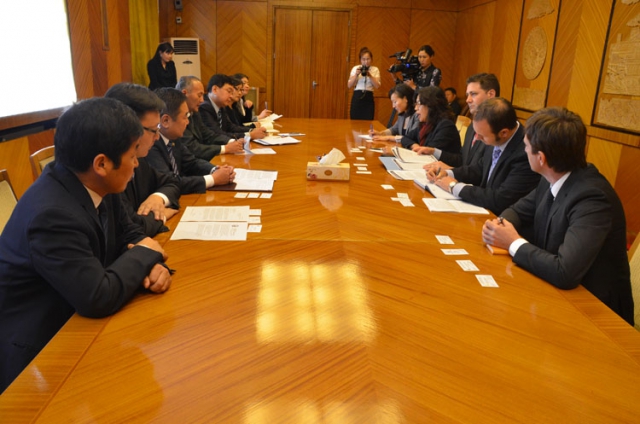ID :
340635
Tue, 09/09/2014 - 12:56
Auther :
Shortlink :
https://www.oananews.org//node/340635
The shortlink copeid
STANDING COMMITTEE HEAD MEETS EXBS PROGRAMME MANAGER

Ulaanbaatar /MONTSAME/ Head of the parliamentary Standing committee on justice D.Ganbat Tuesday received a delegation led by Mr Daniel Blake Pritchett, a manager of the EXBS Programme at the US Department of State.
Beginning the meeting, Mr Pritchett briefed about the programme, and then exchanged views with the Standing committee head on a draft law on the monitoring over the sales of strategic goods and on hazardous garbage.
The government submitted the bill on it to parliament in 2014, but it has been withdrawn in order to revise it. After an approval of the #1540 resolution of the UN Security Council in 2004, the President of Mongolia visited the USA in 2007, signing a bilateral memorandum of understanding on cooperating in preventing the transport of nuclear and other radioactive materials through the state borders, Mr Ganbat said.
In accordance with the EXBS programme, radioactive measuring devices have been installed in border checkpoints of Mongolia since 2008, and the bilateral cooperation in it has reached a specific achievement, Mr Ganbat said, and underlined an importance of preparing experts for this.
The parliamentarian also said the Standing committees on justice, and on environment, food and agriculture are ready to collaborate in this direction.
Present at the meeting were G.Bayarsaikhan, head of the Standing committee on environment, food and agriculture; J.Batzandan and O.Baasankhuu MPs.
The Export Control and Related Border Security (EXBS) Programme seeks to prevent the proliferation of weapons of mass destruction (WMD) and destabilizing accumulations and irresponsible transfers of conventional weapons by helping to build effective national strategic trade control systems in countries that possess, produce, or supply strategic items, as well as in countries through which such items are most likely to transit.
The EXBS Programme is designed to help countries develop and improve their strategic trade and related border control systems. In developing and improving these systems, we work to ensure conformity with international standards for regulating trade in items on the control lists of the multilateral export control regimes, to prevent the authorization of transfers to end-uses and end-users of proliferation concern, and to detect and interdict illicit transfers at the border. In building countries' capacity in this critical area, the EXBS Programme advances U.S. efforts to establish a global WMD detection architecture and helps key partners meet their obligations and commitments pursuant to important U.S. and international initiatives, including UN Security Council Resolution 1540, the Proliferation Security Initiative, the National Security Strategy and adherence to the guidelines of multilateral export control regimes.
The EXBS Programme works with partner governments to identify regulatory and institutional gaps and to develop resource requirements. The EXBS Programme provides a wide range of technical assistance, from executive exchanges to training workshops to the provision of detection equipment and specialized training for border control and enforcement agencies.
The EXBS Programme provides assistance in five core areas--laws and regulations; licensing; enforcement; government-industry cooperation; interagency and international cooperation and coordination.





